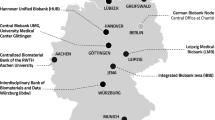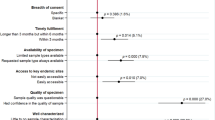Abstract
A diversity of public participation in biobanking is a highlight for the success of biobanks. It was previously reported that only two-thirds of Jordanians expressed interest in biobanking. To promote public involvement in a biobank, it is imperative to determine the aspects that influence the decision-making to participate. On the basis of a national survey involving 3196 respondents, the influence of 13 biobanking factors was assessed, including returning research results, privacy, freedom of choice, uncertainties about research, monetary and health considerations, and personal belief. Perception toward each factor was also correlated with willingness to participate in a biobank. A considerable number of respondents indicated returning research results as influential in their decision to become biobank donors. Interestingly, whereas the positive perception of availability of general results (39%) correlated with willingness to donate for biobanking, the negative view of unavailability of individualized results (47%) did not correlate with unwillingness. Religious permission of sample donation for research had the strongest positive influence (61%) and the highest correlation to participate among positively perceived factors. Unspecified research was highly indicated as a negative factor (45%), but did not correlate with unwillingness to become a biobank donor, whereas allowed withdrawal had a positive effect (31%) and correlation to contribute to biobanking. The negative perception of accessing medical information (9.5%) and re-contact (8.5%) had the strongest correlation with unwillingness to donate to a biobank. These results may provide an insight into how to formulate strategies to promote public participation in biomedical research and biobanking.
Similar content being viewed by others
Log in or create a free account to read this content
Gain free access to this article, as well as selected content from this journal and more on nature.com
or
References
Ahram M, Othman A, Shahrouri M : Public perception towards biobanking in Jordan. Biopreserv Biobank 2012; 10: 361–365.
Al-Jumah MA, Abolfotouh MA : Public perception and attitude of Saudis toward organ and tissue donation. Biopreserv Biobank 2011; 9: 21–27.
Gaskell G, Gottweis H, Starkbaum J et al: Publics and biobanks: Pan-European diversity and the challenge of responsible innovation. Eur J Hum Genet 2013; 21: 14–20.
Kettis-Lindblad A, Ring L, Viberth E, Hansson MG : Genetic research and donation of tissue samples to biobanks. What do potential sample donors in the Swedish general public think? Eur J Public Health 2006; 16: 433–440.
Tupasela A, Sihvo S, Snell K, Jallinoja P, Aro AR, Hemminki E : Attitudes towards biomedical use of tissue sample collections, consent, and biobanks among Finns. Scand J Public Health 2010; 38: 46–52.
Cousins G, McGee H, Ring L et al Public Perceptions of Biomedical Research: a Survey of the General Population in Ireland. Dublin: Health Research Board, 2005.
Chen DT, Rosenstein DL, Muthappan P et al: Research with stored biological samples: what do research participants want? Arch Intern Med 2005; 165: 652–655.
Kaufman DJ, Murphy-Bollinger J, Scott J, Hudson KL : Public opinion about the importance of privacy in biobank research. Am J Hum Genet 2009; 85: 643–654.
Medical Research Council and Wellcome Trust: Public Perceptions of the Collection of Human Biological Samples. London: Medical Research Council, 2001, http://www.ukbiobank.ac.uk/wp-content/uploads/2011/07/Public-Perceptions-Collection-Human-Biological-Samples.pdf (last accessed on 26 June 2013).
Wong ML, Chia KS, Wee S et al: Concerns over participation in genetic research among Malay-Muslims, Chinese and Indians in Singapore: a focus group study. Community Genet 2004; 7: 44–54.
Hoeyer K : Donors perceptions of consent to and feedback from biobank research: time to acknowledge diversity? Public Health Genomics 2010; 13: 345–352.
Ahram M, Othman A, Shahrouri M : Public support and consent preference for biomedical research and biobanking in Jordan. Eur J Hum Genet 2013; 21: 567–570.
Beskow LM, Dean E : Informed consent for biorepositories: assessing prospective participants' understanding and opinions. Cancer Epidemiol Biomarkers Prev 2008; 17: 1440–1451.
Widdows H, Cordell S : The ethics of biobanking: key issues and controversies. Health Care Anal 2011; 19: 207–219.
Ahmad M, Al Gamal E, Othman A, Nasrallah E : Knowledge, attitudes and practices towards cancer prevention and care in Jordan. Report 2011.
Hoeyer K, Olofsson BO, Mjörndal T, Lynöe N : Informed consent and biobanks: a population-based study of attitudes towards tissue donation for genetic research. Scand J Public Health 2004; 32: 224–229.
Beskow LM, Friedman JY, Hardy NC, Lin L, Weinfurt KP : Simplifying informed consent for biorepositories: stakeholder perspectives. Genet Med. 2010; 12: 567–572.
Murphy J, Scott J, Kaufman D, Geller G, LeRoy L, Hudson K : Public expectations for return of results from large-cohort genetic research. Am J Bioeth 2008; 8: 36–43.
Bookman EB, Langehorne AA, Eckfeldt JH et al: NHLBI Working Group. Reporting genetic results in research studies: summary and recommendations of an NHLBI working group. Am J Med Genet A 2006; 140: 1033–1040.
Shalowitz DI, Miller FG : Communicating the results of clinical research to participants: attitudes, practices, and future directions. PLoS Med 2008; 5: e91.
Forsberg JS, Hansson MG, Eriksson S : Changing perspectives in biobank research: from individual rights to concerns about public health regarding the return of results. Eur J Hum Genet 2009; 17: 1544–1549.
Watanabe M, Inoue Y, Chang C et al: For what am I participating? The need for communication after receiving consent from biobanking project participants: experience in Japan. J Hum Genet 2011; 56: 358–363.
Melas PA, Sjöholm LK, Forsner T et al: Examining the public refusal to consent to DNA biobanking: empirical data from a Swedish population-based study. J Med Ethics 2010; 36: 93–98.
Eurobarometer 73.1, Biotechnology Report 2010: coordinated by the Directorate-General for Communication 2010.
Human Genetics Commission: Public attitudes to human genetic information. People’s Panel Quantitative Study Conducted for the Human Genetic Commission. London: Human Genetics Commission, 2001.
Falagas ME, Zarkadoulia EA, Samonis G : Arab science in the golden age (750-1258 C.E.) and today. FASEB J 2006; 20: 1581–1586.
Asai A, Ohnishi M, Nishigaki E, Sekimoto M, Fukuhara S, Fukui T : Attitudes of the Japanese public and doctors towards use of archived information and samples without informed consent: preliminary findings based on focus group interviews. BMC Med Ethics 2002; 3: E1.
Willison DJ, Keshavjee K, Nair K, Goldsmith C, Holbrook AM : Computerization of Medical Practices for the Enhancement of Therapeutic Effectiveness investigators. Patients’ consent preferences for research uses of information in electronic medical records: interview and survey data. BMJ 2003; 326: 31.
Acknowledgements
This work was supported by the Arab Fund for Economic and Social Development (AFESD). The KAP Survey was implemented by King Hussein Institute for Biotechnology and Cancer (KHIBC) under The National Life Science Research and Biotechnology Promotion (LSR/BTP) Initiative in Jordan.
Author information
Authors and Affiliations
Corresponding author
Ethics declarations
Competing interests
The authors declare no conflict of interest.
Additional information
Supplementary Information accompanies this paper on European Journal of Human Genetics website
Supplementary information
Rights and permissions
About this article
Cite this article
Ahram, M., Othman, A., Shahrouri, M. et al. Factors influencing public participation in biobanking. Eur J Hum Genet 22, 445–451 (2014). https://doi.org/10.1038/ejhg.2013.174
Received:
Revised:
Accepted:
Published:
Issue date:
DOI: https://doi.org/10.1038/ejhg.2013.174
Keywords
This article is cited by
-
When Biobanks Meet Religion: Association Between Religiosity and Attitudes of Polish Medical Students Toward Biobanking of Human Biological Material for Research Purposes
Journal of Religion and Health (2024)
-
Assessment of willingness of Saudi public to participate in a dental biorepository for research purposes
BMC Oral Health (2023)
-
Public’s awareness of biobanks and willingness to participate in biobanking: the moderating role of social value orientation
Journal of Community Genetics (2023)
-
Perceptions, attitudes, and willingness of the public in low- and middle-income countries of the Arab region to participate in biobank research
BMC Medical Ethics (2022)
-
Pediatric biorepository participation during the COVID-19 pandemic: predictors of enrollment and biospecimen donation
BMC Pediatrics (2022)



